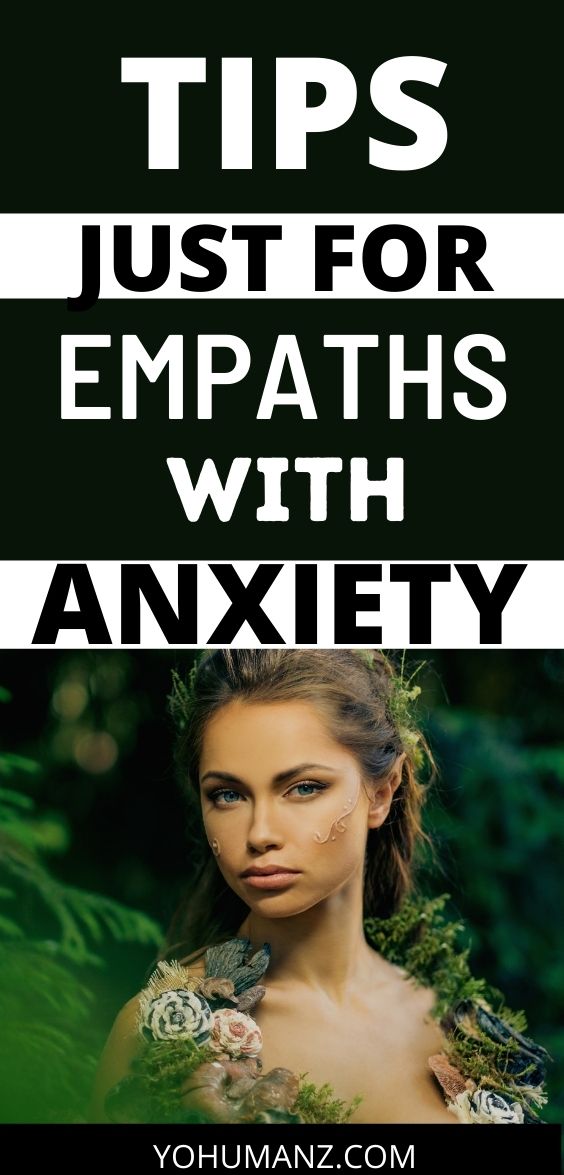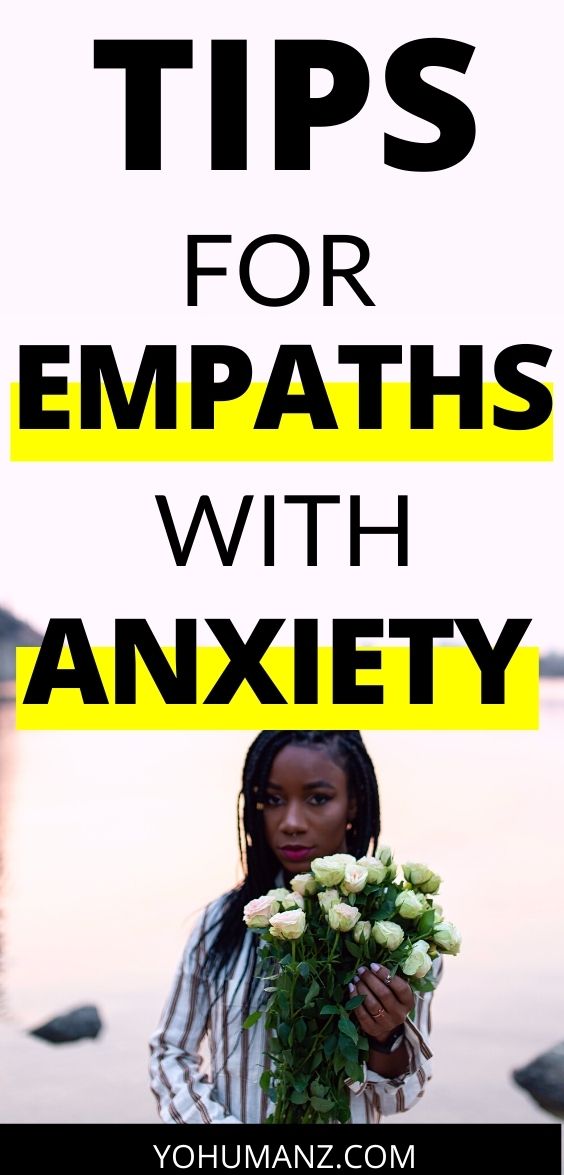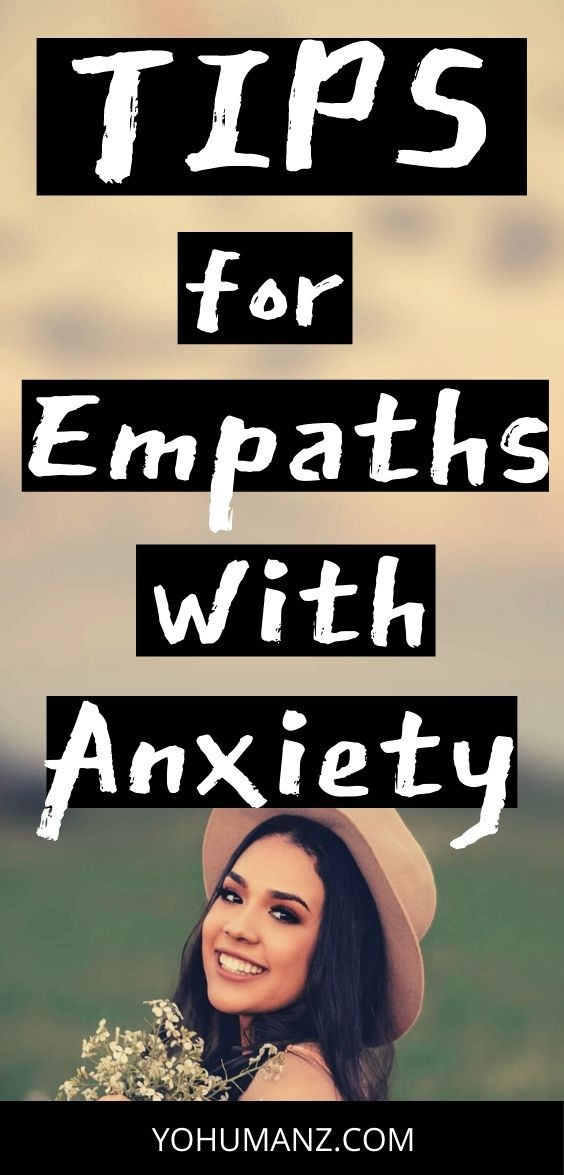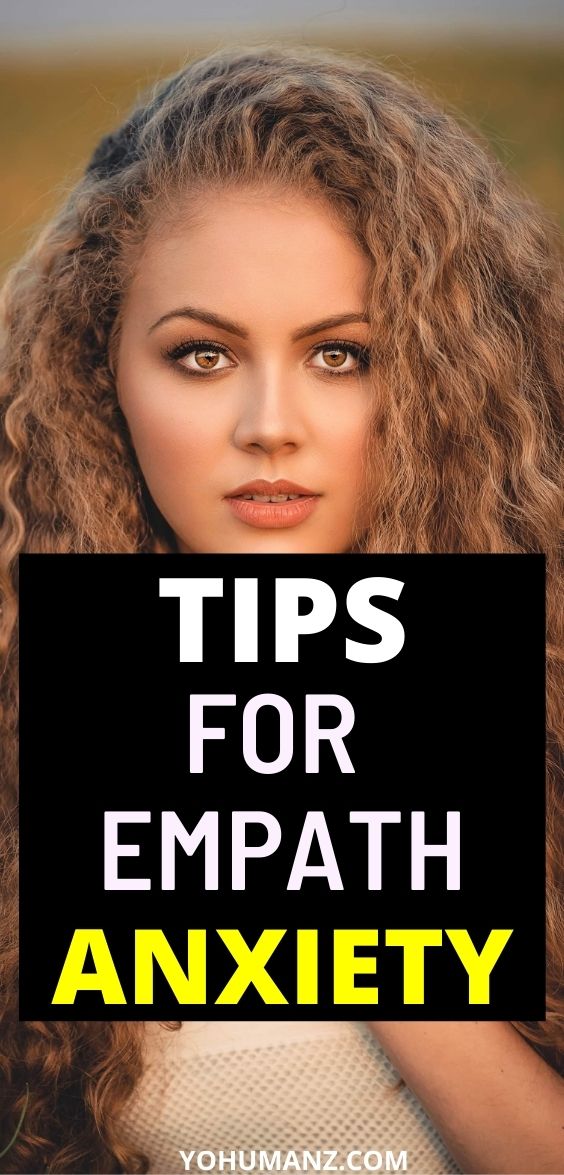Table of Contents
Heart beating. Mind racing. Mouth getting drier.
Am I dying? Am I anxious? Or am I just an empath?
If you’re an empath, you may know the ins and outs of anxiety. But is it your own or someone else’s?
And, either way, what can you do about it?
In this post, we’re talking about empathy anxiety and how you can finally feel better
What is an Empath?
To put it simply, an empath is someone who feels what other people do. The term “empath” was coined by author and Dr. Judith Orloff.
She believes that some people “absorb” other’s emotions and take them on as their own. Whether the emotion is good or bad, they feel it to extremes.
One example of this is walking into a room and immediately feeling the energy of it. Perhaps you suddenly feel anxious or rushed and you don’t know why. It could be because you’re picking up on the emotions of people inside that room. It can work in a positive way too. Let’s say you meet someone in the grocery store and immediately feel connected to them with a sense of purity and joy.
Sometimes empaths know they’re absorbing other people’s emotions. They may realize they feel angry because they met with their usual angry boss, even though they themselves have no reason to be upset. Other times, empaths may not know they’re taking on other energies. They may feel depressed and not know the reason, when really it’s because the friend they’re hanging out with is going through something tough, even if the empath doesn’t know the situation.
Interestingly, it’s also believed that empaths can pick up on physical pain. For example, if your friend starts having back pain, you may also experience some back pain.
Some empaths realize they’re different from others in that they feel more intensely. So, they may research and come across the concept of empaths and learn more about themselves. In this process, they can learn how to protect their energy and how to tell which emotions are and aren’t there. However, other empaths live their entire life without classifying themselves as “empaths.” These people may struggle to control their emotions, or they may develop their own set of ways to cope.
Being an empath can be exhausting with many negatives. However, it can also have many benefits, especially when you learn how to control your empathic abilities.
Empaths are usually highly intuitive. This means they get “gut feelings” about people that typically turnout to be true. Some people look at this insight as something magical. Other people say it’s a natural benefit of reading very subtle body language and cues.
What is Empath Anxiety?

If you are or think you’re an empath suffering from anxiety, you’re not alone. Many empaths experience anxiety for multiple reasons. In fact, one study found that people with social phobia show more sensitivity and attentiveness to other people’s mental states. The authors go on to state that socially anxious people may demonstrate unique abilities like cognitive empathy.
We’re breaking empath anxiety down into 2 major categories:
- Empath anxiety that comes from others
- Empath anxiety that comes from a clinical disorder
If being anxious is becoming a problem for you, to figure out the solution, you need to understand where the anxiety is coming from.
Empathy Anxiety from Others
The first reason empaths may experience more anxiety than the average non-empath is because they pick up on the emotions of others. For example, if your friend is very anxious and you hang out and begin feeling anxious, the feeling may go away as soon as you leave your friend. Or, perhaps your boyfriend or girlfriend is a very anxious person and you’re constantly picking up on it, making it feel like you have the anxiety disorder.
Since empaths feel the emotions of others, they can be particularly susceptible to negative emotions like anxiety. You’ll know this is the cause because your anxiety will come and go depending on how frequently you connect with the anxious person or place. If you feel anxiety every time you go inside a specific person’s home, and you stop going to their home, you should stop feeling anxiety if that’s the cause.
However, we need to be careful to not blame our anxiety on others. For example, we may be suffering from a clinical anxiety disorder, but because we’re empaths, we may believe the anxiety is someone else’s and we’re just picking up on it. In these cases, falsely blaming your mental health on someone else will do more harm than good. For one, you wrongly blame someone else. And secondly, you won’t find the solution if you can’t realize the issue is inside you.
If your anxiety is coming from other people, the best thing you can do is learn how to protect yourself from other people’s energies.
Empath Anxiety from a Clinical Disorder
Many times, empath anxiety isn’t from other people—it’s from you. Empaths are often highly sensitive people. That means we’re more tuned into our own emotions, surroundings and thoughts. Because of this, we are more susceptible to anxiety.
Let’s take an example of a conversation with a boss. Most people will have the conversion and go on with their day. But empaths may question it more. Because they’re sensitive, they may read their bosses’ low energy as disappointment. They may be inside their head more, replaying the conversation. They may already be on high-alert because of all the people in the office building. All of these factors can trigger anxiety for the empath.
Of course, we all have moments where we feel anxious. But ongoing and long-term anxiety may be classified as a clinical anxiety disorder. If you think this is the case, you should talk to your doctor who can help you form a treatment plan.
Empaths and Social Anxiety

Social anxiety disorder (aka social phobia) occurs when a person is fearful of being judged or watched by others in social situations such as conversations, work, school or even just walking down the street or talking to the cashier. As with most disorders, there’s a spectrum. While you may not have “social anxiety” as a clinical disorder, you may relate to many social phobia traits on a lesser level. Or, your clinical social anxiety may affect you so much that it’s hard to do anything with another human being.
Interestingly, science has found a link between empaths and social anxiety. We talked above about the study that found socially anxious people were more empathic. Another study came to similar conclusions. It found that those with social anxiety disorder have no difficulty perceiving the emotions of others. There was one caveat though: they’re less able to share the positive emotions of others.
One reason why those that suffer from social anxiety may be more empathic is because they spend more time listening. If you have social anxiety, you’re more likely to be an observer than a talker. If you’ve been this way since childhood, you’ve had a lifelong lesson about other people. The payoff could be that you can read people easier, including their emotions. Because those with social anxiety tend to be more in their heads, they may also be better mentally primed to feel the emotions of others too.
Empath Anxiety and Trauma
Another possibility why some empaths suffer more from anxiety could be because of childhood trauma.
According to Dr. Judith Orloff, one of the possible reasons empaths become empaths is because of trauma. This could be physical or emotional abuse to growing up with an alcoholic parent, etc. Why would this cause a child to become an empath? The theory is that if the home wasn’t always considered “safe,” a child has to read their surroundings to learn how to act to stay safe. For example, let’s say you grew up with a narcissistic parent who has good days and very bad days. As you grew up, maybe you learned that the way they walked down the stairs each morning indicated whether it was a good or bad one. Maybe a heavy walk meant it was a bad day and you’d need to walk on eggshells. And a lighter walk meant you could breathe a little more that day.
Another example could be reading subtle cues of a parent during a conversation. You knew that a certain tone in their voice, look in their eye or specific mannerism meant that they were on their first and last fuse before they unleashed their wrath.
These small lessons grow into patterns we unconsciously look for in other people. As we grow up, not only do we use these skills to read our parents, but to assess the world around us. As we become more sensitive, we can better read and feel other’s emotions.
Okay, so that’s what ties empaths to trauma. But what ties empath trauma with anxiety?
Well, trauma of any form can result in post-traumatic stress disorder (PTSD). PTSD is actually a type of anxiety disorder with many possible differing symptoms. Even if people with trauma don’t experience PTSD, they may experience other forms of anxiety, such as generalized anxiety disorder. Science has repeatedly shown the connection between trauma and anxiety.
In short, both anxious and empathic traits can be a result of childhood trauma.
How to Deal with Empath Anxiety and Be an Empowered Empath
To get rid of anxiety as an empath, you should first consider its source. If your anxiety is situational and comes from being an empath, tips on how to protect yourself will be the most relevant. If you have an anxiety disorder, no matter how much protection you do, it won’t help you unless you also address your own issues. This is best done through professional help, whether that includes therapy, medication, or both.
Try Therapy
Especially if you think or are suffering from a social anxiety disorder. But even if you’re not, many people can benefit from therapy. It’s unfortunate our governments don’t support mental healthcare for all citizens. If you are covered under your healthcare plan, research therapists you think may be a good fit and make an appointment. You can also ask therapists if they work on a sliding scale, meaning they adjust their prices according to your income.
If you don’t have coverage, you can find cheaper options through online counseling websites. You can also search “affordable therapy” + “your area” on Google. Some community centers may also offer therapy in your area. Chatrooms like Healthfulchat.org and 7Cups provide peer support.
Read: 29 Mental Health Tips + Resources
Enforce Boundaries
As an empath, boundaries are very important. Because you feel so deeply, it can be difficult to not be on call for everyone who needs you. It can also be difficult to leave situations where you feel you’re picking up people’s emotions, such as anxiety. Remind yourself to not only set clear boundaries, but to follow them yourself. If other’s don’t respect your boundaries, it’s likely a good idea to break the connection if possible.
Ground Yourself
Grounding yourself is really important for empaths because it connects you to the earth and the world at large, instead of being a victim to your own inner world. People do this differently. Here’s some ideas:
- Take a silent walk in nature
- Envision roots going from your feet into the earth’s core
- Meditate
- Trace the outline of your hand and each finger, breathing in and out
Protect Yourself
Many empaths using “energy protection” techniques to stop others from affecting their emotions. Again, people protect themselves in different ways, but here’s a few ideas:
- Envision a white light surrounding and protecting you
- Envision a cord between you and the other person and then envision cutting that cord
- Next time you feel yourself absorbing someone’s emotions, envision putting a mirror between you and the other person, reflecting the energy back at them.
- Use empath protection crystals
- Frequently smudge your space and yourself to reset the energy
Summary of Empowered Empath Anxiety
When it comes to empath anxiety, the emotion may be absorbed from others or it may be your own. It’s also easy to confuse the two, blaming your own anxiety disorder on someone else. In any case, empaths are more likely to experience an anxiety disorder than the general population for multiple reasons outlined in this post. In any case, empaths can benefit from therapy, protection and grounding techniques to help curb their anxious minds.




